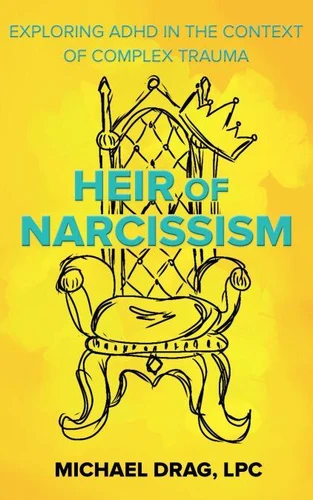Heir of Narcissism: Exploring ADHD in the Context of Complex Trauma
Par :Formats :
Disponible dans votre compte client Decitre ou Furet du Nord dès validation de votre commande. Le format ePub est :
- Compatible avec une lecture sur My Vivlio (smartphone, tablette, ordinateur)
- Compatible avec une lecture sur liseuses Vivlio
- Pour les liseuses autres que Vivlio, vous devez utiliser le logiciel Adobe Digital Edition. Non compatible avec la lecture sur les liseuses Kindle, Remarkable et Sony
 , qui est-ce ?
, qui est-ce ?Notre partenaire de plateforme de lecture numérique où vous retrouverez l'ensemble de vos ebooks gratuitement
Pour en savoir plus sur nos ebooks, consultez notre aide en ligne ici
- FormatePub
- ISBN978-1-967638-00-0
- EAN9781967638000
- Date de parution09/05/2025
- Protection num.pas de protection
- Infos supplémentairesepub
- ÉditeurMichael Drag
Résumé
Living with ADHD can feel like the world wasn't made for you. But what if it's really a superpower in the wrong context?Too often, a neurodivergent person can feel like the world wasn't made for them. They take this perspective and blame themselves for issues they can't fix in others, and yet they rarely take credit for their successes. Clinicians, people with ADHD, and their family may struggle to understand this disorder beyond the diagnostic criteria.
It frustratingly affects many aspects of daily living that don't seem to count toward or are often neglected in treatment paradigms. But what if we could think about ADHD in a new context?ADHD is far more complex than a diagnosis. It's systemic in the lives of people with ADHD and often misunderstood by those around them. Yet perhaps looking at ADHD with a wider focus, looking through the context of complex PTSD and challenging the assumed origins of the disorder, can help reveal the hidden superpowers.
Tackle an unfair locus of control. Name the strengths of each person with ADHD. Challenge your own ideas about people with ADHD and how to care for them from a place of empathy. Then, let's work on changing the world together.
It frustratingly affects many aspects of daily living that don't seem to count toward or are often neglected in treatment paradigms. But what if we could think about ADHD in a new context?ADHD is far more complex than a diagnosis. It's systemic in the lives of people with ADHD and often misunderstood by those around them. Yet perhaps looking at ADHD with a wider focus, looking through the context of complex PTSD and challenging the assumed origins of the disorder, can help reveal the hidden superpowers.
Tackle an unfair locus of control. Name the strengths of each person with ADHD. Challenge your own ideas about people with ADHD and how to care for them from a place of empathy. Then, let's work on changing the world together.
Living with ADHD can feel like the world wasn't made for you. But what if it's really a superpower in the wrong context?Too often, a neurodivergent person can feel like the world wasn't made for them. They take this perspective and blame themselves for issues they can't fix in others, and yet they rarely take credit for their successes. Clinicians, people with ADHD, and their family may struggle to understand this disorder beyond the diagnostic criteria.
It frustratingly affects many aspects of daily living that don't seem to count toward or are often neglected in treatment paradigms. But what if we could think about ADHD in a new context?ADHD is far more complex than a diagnosis. It's systemic in the lives of people with ADHD and often misunderstood by those around them. Yet perhaps looking at ADHD with a wider focus, looking through the context of complex PTSD and challenging the assumed origins of the disorder, can help reveal the hidden superpowers.
Tackle an unfair locus of control. Name the strengths of each person with ADHD. Challenge your own ideas about people with ADHD and how to care for them from a place of empathy. Then, let's work on changing the world together.
It frustratingly affects many aspects of daily living that don't seem to count toward or are often neglected in treatment paradigms. But what if we could think about ADHD in a new context?ADHD is far more complex than a diagnosis. It's systemic in the lives of people with ADHD and often misunderstood by those around them. Yet perhaps looking at ADHD with a wider focus, looking through the context of complex PTSD and challenging the assumed origins of the disorder, can help reveal the hidden superpowers.
Tackle an unfair locus of control. Name the strengths of each person with ADHD. Challenge your own ideas about people with ADHD and how to care for them from a place of empathy. Then, let's work on changing the world together.



